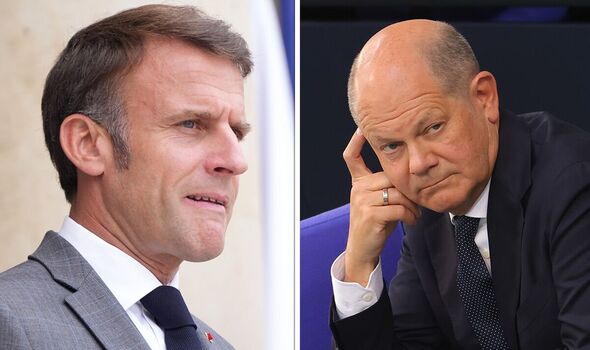France and Germany are on a collision course as Emmanuel Macron opened the doors to the premiership to “deeply Germanophic” extremist parties, German experts have warned.
President Macron earlier this month announced France would head to the polls early after he suffered a crushing defeat at the European elections, which handed a huge victory to the far-right National Rally (RN).
The decision left many across Europe baffled, and sparked major concerns in neighbouring Germany on the impact the win of RN leader Jordan Bardella could have on the nations’s alliance.
Mr Bardella has emerged as the favourite to win in the poll, an outcome that pushed left parties to form a coalition, the New Popular Front, to keep Mr Bardella out of government. The coalition includes the far-left La France Insoumise.
Nils Schmid, the Social Democratic Party (SPD) spokesman in the Bundestag, warned an RN election would be a “catastrophe” for Germany’s relationship with France.
Mr Schmid said: “The RN is deeply Germanophobic. Its coming to power would be a catastrophe for cooperation between France and Germany.”
The head of the French-German Youth Office, Tobias Bütow, echoed the concerns: “In Germany, many people fear that a far-right victory in France would plunge relations between our two countries into their most serious crisis since the Second World War.”
While RN represents the main concern for German politicians, the prospect of a far-left win fuels an equal amount of fear as both parties would likely cause major issues in the European Union as well.
Christian Democrats’s Inge Grässle predicted Germany and France will face an “extremely serious crisis” at a time when relations are already struggling.
Speaking to Le Monde, Ms Grässle said: “The two parties that will carry the most weight in the next Assemblée Nationale will undoubtedly be the Rassemblement National, on the far right, and La France Insoumise on the far left.
“Both hate Germany, both are enemies of Europe, and both have extremely worrying economic programmes.”
She added: “Whether one or the other has the most elected representatives, the French-German engine, which is already not running very well, will enter into an extremely serious crisis.”
Earlier this week, Mr Macron appealed to the French public not to be lured in by extremist parties, saying both RN and La France Insoumise bring bad responses to “real problems” because they “respond in some way by increasing conflict and civil war.”
Polls show that the outcome of the early election remains uncertain amid a complex voting system and potential alliances.
President Macron is aligned against both the RN and the New Popular Front.
